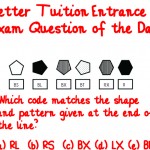Is your child taking entrance exams in Trafford over the next few weeks? Here are the questions we Better Tuition is most frequently asked during this crucial time.
1. What sort of reward should I tell my child to expect if s/he passes?
None! Imagine being ten again: if your parents offered you a fantastic present such as an iPad, or a holiday for passing your exams, and then you failed you would not only have failed but also have missed out on something you really, really want. To a ten year old, that feels like punishment. Very few children will do any less than their very best in an exam, so rather than rewarding success, which is its own reward, you should consider a reward that will motivate your child to spend time preparing for the exams. The best rewards are simple ones like a trip to the park or the swimming pool, or a cake or staying up half an hour past bedtime at the weekend. Reward effort not outcome!
2. My child is really nervous: what can I do?
Nerves can be as big a barrier to exam success as not knowing the answer! Talk your child through Better Tuition’s relaxation techniques: they are very simple and will really help your child before and during the exam. They take five minutes to learn and previous students have used them to great effect.
3. I feel really anxious as a parent: what can I do?
We really do sympathise with this one: we have tutored hundreds of children through their grammar school entrance exams and we can assure you, you are not alone if you feel anxious as a parent! First and foremost, you should try not to let your anxiety show, difficult though this is. Secondly, try using our relaxation techniques yourself (they do work!). Thirdly, it really is a good idea to avoid school gate discussion of practice test scores: unless your child is a genius this sort of thing can only make you more anxious (and if they are a genius, why are you anxious?).
4. How should we be practising in the final couple of weeks?
As well as our own tuition, Better Tuition recommends GL Assessment practice papers – and you should be tackling them with a vengeance by now. Your child will benefit from instant feedback, so you must always try to mark their work immediately (we do – and we mark our practice tests within 24 hours). It can beneficial to complete each paper around 2-3 times and you should now be completing whole papers in the most realistic timed conditions you can muster.
5. It’s all turned into a drag: how can I put the fun back into entrance exam preparation?
Use our Entrance Exam links, which direct your child to fun learning activities and learning games which directly relate to the entrance exams.
The weekend before the exam, why not have an entrance exam party? Get mostly adult family round to take part in entrance exam quizzes and compare scores. Designate a quiz maestro and mix up ‘on the buzzer’ rounds with timed tests (read out a maths problem and get them to hold up their answer after 90 seconds), photocopied sections of the practice tests, and Odd One Out rounds (NVR or VR is ideal for this). Your child’s confidence will soar as s/he observes the dismal performance of most adults on these tests and although the quizzes will give your child a good practice, it won’t feel like work or pressure, and trust me, the adults will LOVE it!
Finally, entrance exam season can be an anxious time for everyone (even tutors!) but try to stay as calm as you can. If you need help, advice or lessons, call Better Tuition on 0161 748 3912 or pop in to our office at1 Crofts Bank Road,Urmston,M41 0XH and see us.















